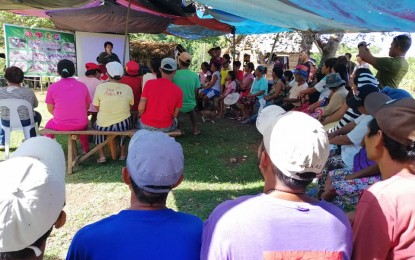
FORMER NPA SUPPORTERS. Members of a farmers' organization in Calubian, Leyte known for supporting the New People's Army (NPA) attend an orientation on Enhanced Comprehensive Local Integration Program (E-CLIP) held on Nov. 4, 2019. Just this month, the program meant for NPA fighters and supporters has benefitted 156 people in Eastern Visayas region. (Photo courtesy of Philippine Army)
TACLOBAN CITY -- Provincial governments in Eastern Visayas have intensified the implementation of the Enhanced Comprehensive Local Integration Program (E-CLIP) benefitting at least 156 former rebels this month.
Capt. Reynaldo Aragones, spokesperson of the Philippine Army's 8th Infantry Division, said local government units in Eastern Samar, Leyte, and Northern Samar provinces have been rolling out the E-CLIP to encourage more rebels to surrender.
“The concerted efforts undertaken by the task force on ending the local communist armed conflict (ELCAC) will make rebels realize that the government is sincere in the promotion of peace and the general welfare of all,” Aragones said in a phone interview on Monday.
Aragones said the latest release of financial assistance to former NPA fighters and their supporters was held last November 18 at the Eastern Samar provincial capitol in Borongan City.
Each of 10 former rebels got PHP15,000 from the provincial social welfare and development office as immediate financial assistance. Two of them received PHP50,000 in livelihood assistance.
In Northern Samar, the Technical Education and Skills Development Authority provincial office introduced the 12-day cookery training to former rebels and 18-day bread and pastry making training on November 15.
The program meant for 60 former rebels, is under the poverty reduction livelihood and employment cluster being carried out by the Task Force ELCAC.
On Nov. 4, some 86 farmers and members of people’s organizations who supported the communist terrorist group completed the 90-day training on compact farming for high-value vegetables and fruit crops production in Calubian, Leyte.
Under E-CLIP, each former rebel is granted immediate assistance of PHP15,000 and livelihood assistance of PHP50,000. Surrenderers are entitled to firearms remuneration. The amount varies according to the kind of firearms surrendered.
E-CLIP is locally-driven, managed and implemented. The province or highly urbanized city is the focal point of authority and management of the integration program to provide more sustainability and consistency.
The program veers away from the past practice of pre-packaged interventions designed at the national level. It responds to the circumstances, needs, and concerns of former rebels through the provision of assistance and seeks to consider their basic rights and situations as men and women. (PNA)
